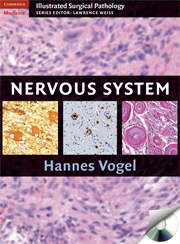Book contents
- Frontmatter
- Contents
- Contributors
- Preface
- Acknowledgments
- 1 Normal Anatomy and Histology of the CNS
- 2 Intraoperative Consultation
- 3 Brain Tumors
- 4 Vascular and Hemorrhagic Lesions
- 5 Infections of the CNS
- 6 Inflammatory Diseases
- 7 Surgical Neuropathology of Epilepsy
- 8 Cytopathology of Cerebrospinal Fluid
- Index
2 - Intraoperative Consultation
Published online by Cambridge University Press: 04 August 2010
- Frontmatter
- Contents
- Contributors
- Preface
- Acknowledgments
- 1 Normal Anatomy and Histology of the CNS
- 2 Intraoperative Consultation
- 3 Brain Tumors
- 4 Vascular and Hemorrhagic Lesions
- 5 Infections of the CNS
- 6 Inflammatory Diseases
- 7 Surgical Neuropathology of Epilepsy
- 8 Cytopathology of Cerebrospinal Fluid
- Index
Summary
Intraoperative consultation has always represented a significant challenge for both the general surgical pathologist and the neuropathologist alike. Most of the neurosurgeon's goals are quite similar to those of other surgeons, namely to confirm the presence of an adequate sample for diagnosis and to allow the pathologist to choose between various alternatives in processing the tissue according to the suspected diagnosis. Key aspects of the patient's neurological history should be known at the time of intraoperative consultation, including the timing of onset of symptoms, any focal features such as seizures, motor or sensory deficits, constitutional symptoms, and sometimes a history of exposures and travel.
The available radiographic studies must be examined prior to intraoperative consultation as well as previous surgical material in recurrent or metastatic lesions. As always, direct and unambiguous communication with the surgeon is of paramount importance. This includes conveying the need for cultures whenever an infectious process is suspected through intraoperative consultation.
There are also some important differences underlying the call for intraoperative consultation in neurosurgical specimens as compared with those directed at general surgical pathology. Neurosurgeons are almost never interested in determining the presence of a neoplasm at the resection margin, since complete surgical resection is not a viable option in the resection of most primary brain tumors. This is notwithstanding the fact that the extent of surgical resection is of primary importance in the prognoses of some primary brain tumors: ependymomas, some WHO Grade I tumors such as pilocytic astrocytoma, ganglioglioma or dysembryoplastic neuroepithelial tumor, meningiomas, and some metastatic lesions.
- Type
- Chapter
- Information
- Nervous System , pp. 20 - 23Publisher: Cambridge University PressPrint publication year: 2009



